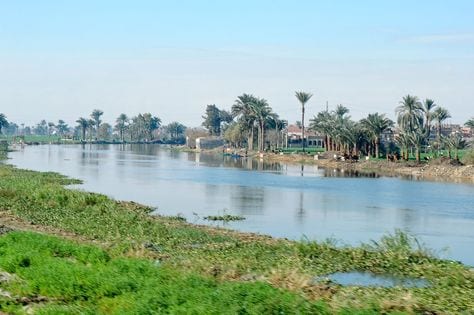The Bahr Yussef (waterway of Joseph is a canal that connects the Nile River with the ancient city of Fayyum in Egypt.
According to Bill Cooper The Authenticity of the Book of Genesis:
“It is a lush and fertile area, famed for its ‘gardens, oranges, mandarines, peaches, olives, pomegranates and grapes’. It has been like this for well over 3,000 years, and owes its lush fertility to a 200 mile-long canal which still conveys to it the waters of the Nile in a constant year-round flow. It is an astonishing feat of engineering which to this day is known throughout Egypt as the ‘Bahr Yusuf’ – the Joseph Canal. This has always been its name. Moreover, the people of Egypt are perfectly happy to tell you that it was built by the Joseph of the Bible who once was Pharaoh’s ‘Grand Vizier’”
The canal could be one of the provisions Josef took when helping Egypt avoid famine:
So Yosef gained possession of all the farm land of Egypt for Pharaoh, every Egyptian having sold his field because the famine was too much for them; thus the land passed over to Pharaoh. And he removed the population town by town, from one end of Egypt’s border to the other. (Genesis 47:20-21)
During ancient times, it was refered to as the Mer-Wer (the Great Canal). The project was constructed during the time of the Pharoh Amenemhat III, who was also referred to as Moeris (similar to Mer-Wer). The Arabic name refers to the prophet Yusuf, the Quranic counterpart of the Biblical Joseph.
In ancient times, the canal was a natural tributary of the Nile River that created a lake to the west when flooding was high. But during 12th dynasty, the water passage was increased and the Fayyum was developed to broaden Lake Moeris. The canal was constructed inside the the valley’s natural incline, resulting in a 15 km long (9.3 miles) channel and 5 m (3.2 feet) deep. The canal sloped downward into the Fayyum depression.
The Bible discusses one of the famines that struck Egypt during Joseph’s reign. According to a study by BH Building and Construction, the famine resulted from the capture and the breaching of the Ha-Uar dam by the King of Upper Egypt.
Now there was no bread in all the world, for the famine was very severe; both the land of Egypt and the land of Canaan languished because of the famine. (Genesis 47:13)
The famines ended by the recapture and repair of the dam by the King of Lower Egypt. According to legend, Joseph (BCE 1730) restored the canal and the dams which were maintained by Hebrew slaves.
Thus Yisrael settled in the country of Egypt, in the region of Goshen; they acquired holdings in it, and were fertile and increased greatly. (Genesis 47:27)
When the Jews fled Egypt with Moses, the same report claims that stories relate that the Egyptian military was swallowed by the sea when it crossed the “Red Sea” and that the drowning of the Egyptians was likely catalyzed by the breaching of the Ha-Uar dam.
The canal was regulated by the Ha-Uar Dam. This dam was in fact two separate dams that controlled the flow into the lake and out of the Nile River. As the surrounding region morphed at around 230 BCE. After that, the Bahr Yussef Canal was largely neglected, leaving the majority of Lake Moeris to dry up. This created a depression that still exists today in the contemporary province of Al Fayyum.
The Bahr Yussef still exists today, feeding water northwards into the Birket Qarun, which is parallel with the Nile.



